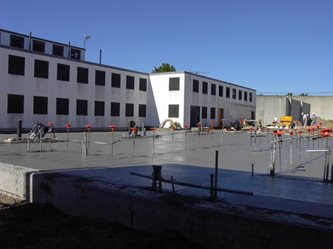Image

The comfort and security of owning your own home should be accessible to everyone, believes Robert Corley, executive director of NeighborWorks Southern Mass. And to him, that’s more than just proverbial saying on a wall.
Two months ago, Corley walked through the security gauntlet of Massachusetts’ Concord Correction Institution—a 614-bed, medium-security prison for men and the state’s oldest—and taught a class on how to buy a house.
“A friend of mine who speaks to Concord residents invited me to present. And I immediately knew I wanted to try it,” says Corley, adding that his organization already partners with a local service for the homeless to provide housing. “Concord has a large population; many of them have no homes to return to, so they end up in the local homeless shelter. This is a way to ‘meet then where they are,’ before re-entry, to prepare them with some financial education.”
After passing a background check and receiving an orientation on the prison—including the risks and what to do in the case of security breach while inside—Corley taught two evening sessions on preparing for homeownership as part of a curriculum series called Money Smart developed by the Federal Deposit Insurance Corp. (FDIC). There six modules in the series, and Corley taught two of them, each two-and-a-half hours long, for the 15 men who signed up.
“I was very nervous at first, mainly because of all the security precautions,” Corley recalls. “But it wasn’t that different from any other similar class I’ve taught.”

There were two exceptions, however. Corley says he typically approaches public education from a consumer-protection perspective, coaching participants how to be on the alert for scams and protect themselves. However, the colleague who invited him cautioned him to downplay that aspect, to emphasize that safely buying an affordable home is “really something they can do. And actually, even for individuals who don’t have savings at all waiting for them, they can do it in this area. You can buy a decent house with just a $3,000 down payment.”
Another exception from the norm is the fact that he was given no background information on the men who attended, including how soon they would be released, and the participants were on a strict schedule. There was no time to get to know them before or after—and no opportunity for follow-up. “It was depressing to see how very young one of them looked,” Corley adds.
“Some asked questions, some didn’t,” he reflects, adding that a few had clearly owned property before. “One man was very engaged in the first half of the class, and then just stopped. I would have liked to have known why. But overall, it was a very engaged group.”
Corley says he’d like to continue to work with this population, but will need to explore how to pay for the time of his staff. Other organizations interested in educating this population should contact their local correctional institutions and learn the process. “They offer all sorts of classes taught by community members,” Corley says, “ranging from Buddhism to public speaking. It’s a good opportunity for everyone.”

